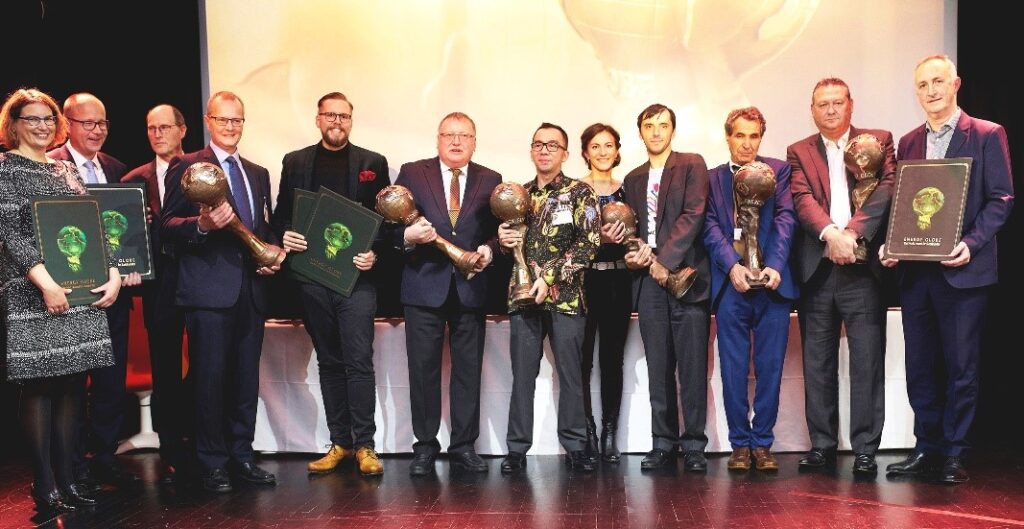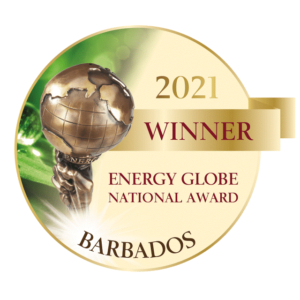Barbados wins Energy Globe Award 2022 for the 3rd time
Barbados makes the headlines again! This time around in the energy sector.
Established in the 90’s, Energy Globe was birthed for the purpose of creating energy that’s renewable and sustainable without having to destroy the atmosphere. In 1999, the Energy Globe Award was birthed by Wolfgang Neumann. The main purpose of the award is to help recognize and showcase ideas and innovative projects, on a global scale, presented by different countries towards the fulfillment of creating a world that produces energy that’s clean and sustainable, using the natural resources available. Barbados has just won the Energy Globe award for the third time in 2022

As the world continually undergoes climate changes, some of which are drastic and some mild, the dynamics of the change depends on how the environment is catered for. Many of these changes span from the constant infusion of fossil fuel gases into the environment for energy production.

This has gone on for decades and has had a negative impact on the environment and the world at large. Hence the need for innovative ideas on the production of renewable energy from earth’s resources without an adverse effect on the environment.

The Award began in Austria and for the past 22 years, these awards have been given out in 5 different categories, namely,
- Earth Category
- Water Category
- Fire category
- Air category
- Youth category, and the recently introduced Sustainable startup category.

These awards help create global awareness while motivating and encouraging countries to do more in terms of innovations and projects towards creating renewable sustainable energy, gradually eliminating the pollution of the environment through industrialization

The Energy Globe Awards over the years has become the most recognized environmental award with over 170 countries participating and around 2000 projects being submitted annually for the purpose of recognition and funding. So far, the addition of new countries has been on the rise, thereby fulfilling the vision of global awareness. With an increase in awareness, more nations will begin to adopt new measures of energy production, which will invariably increase the percentage use of renewable energy and a corresponding drop in percentage for the use of fossil fuels for energy.
Barbados is an independent commonwealth nation located in the Caribbean. It is an island with a population of about 300,000 people. Considering the fact that Barbados is an island, its major earth’s resource would obviously be water. Hence, it is only reasonable for most of its projects to border around the use of water to generate clean energy.

Barbados has been undergoing a series of challenges with the production of fresh water. It’s only incongruous that a country surrounded by water should be having challenges of water production, but in recent years, there has been a corresponding drop in the underground fresh water level due drought in the land. This drop in underground fresh water level invariably means a rise in sea water level. This has played an adverse role in the agricultural sector and also affected the health of citizens.

Succeeding this drought challenge, and the drop in underground fresh water level, the Government of Barbados aligned with the Caribbean Community Climate Change Center (CCCCC) to secure a grant from Green Climate Fund (GCF) in 2015 with additional finance from Barbados Water Authority (BWA) aimed at improving the water resilience in Barbados over a 5-year span.

With the infusion of over $45 million, the projects began. Over the years, following the funding, significant changes have been made to tackle the peculiar national challenge and with the topic, ‘Water Sector Resilience Nexus for Sustainability (WSRN-S) in Barbados’ submitted to the Energy Globe, CCCCC secured their third consecutive award. This Award further places Barbados on the global scene and also showcases the nation as an advocate for the production and consumption of renewable energy in the 21st century.

The major outcome of this project is to contribute immensely to the continuous supply, distribution, and availability of fresh water through the infusion of renewable energy technologies with the purpose of reducing greenhouse gas emissions. Technological inclusion involved the Installation of PV systems with backup gas powered mini-turbines at pumping stations across the island,

ensuring that those pumping stations are independent to power outages, which could negatively impact the distribution of water due to reduced pumping capacity. Hence, in case of a power failure, the power requirements of any selected pumping stations will not be disrupted. This means that the water production and distribution will remain undisturbed for most of the island.

The facility is created in such a way that once there is a power failure on the grid, the PV systems and the mini-turbines or generators will switch on simultaneously, allowing for a regular supply of water to highly populated areas. With the increased reliability and affordability of battery technology, more battery backup provision will be adopted to ensure the continued progress of resilience at pumping stations across Barbados.

In a statement by Dr. Colin Young, Executive Director at the CCCCC, “The WSRN S-Barbados project is a flagship GCF project being implemented by the CCCCC, a regional Direct Access Entity to the GCF and it is one of the best performing projects globally among Small Island Development States (SIDS)”. “We are honored to have won this award; it demonstrates the capacity and experience of the CCCCC to develop and implement, in partnership with CARICOM Member States, innovative and transformative projects that build the climate resilience and sustainable development of our Caribbean people,” he added.

So far, the project implementation has been a high success and has addressed the fresh water challenges in regions of higher population density. Over the years, more pump stations will be built to address this challenge in other regions of the island until freshwater scarcity, as a result of drought, becomes a thing of the past.
Going forward, more research would still be conducted by the CCCCC and the world won’t be surprised if another Energy Globe Award is handed over to the center and Barbados at large.
__M.E.


0 Comment